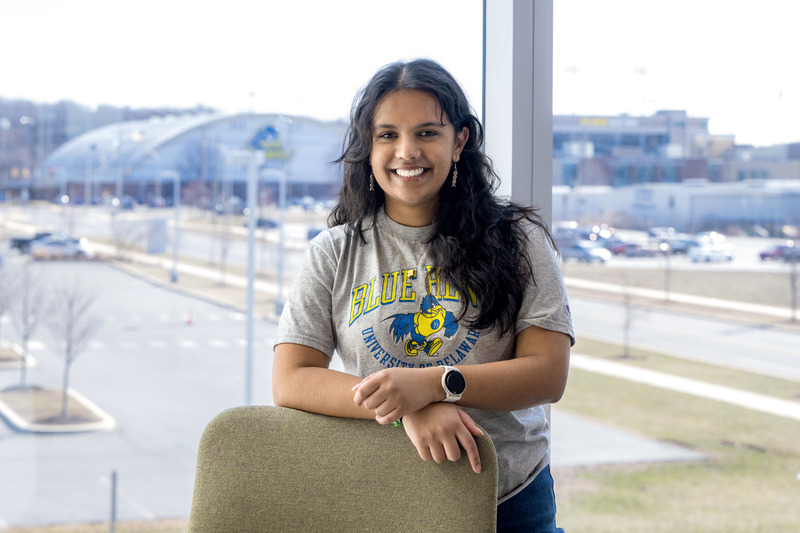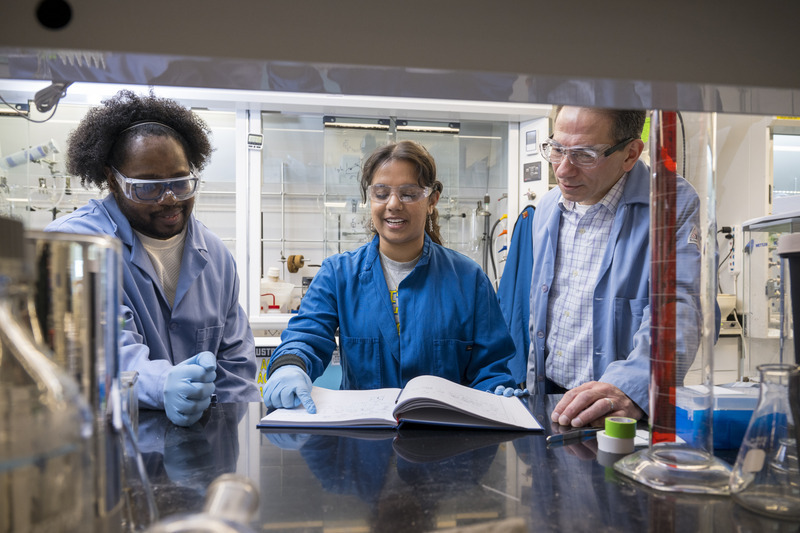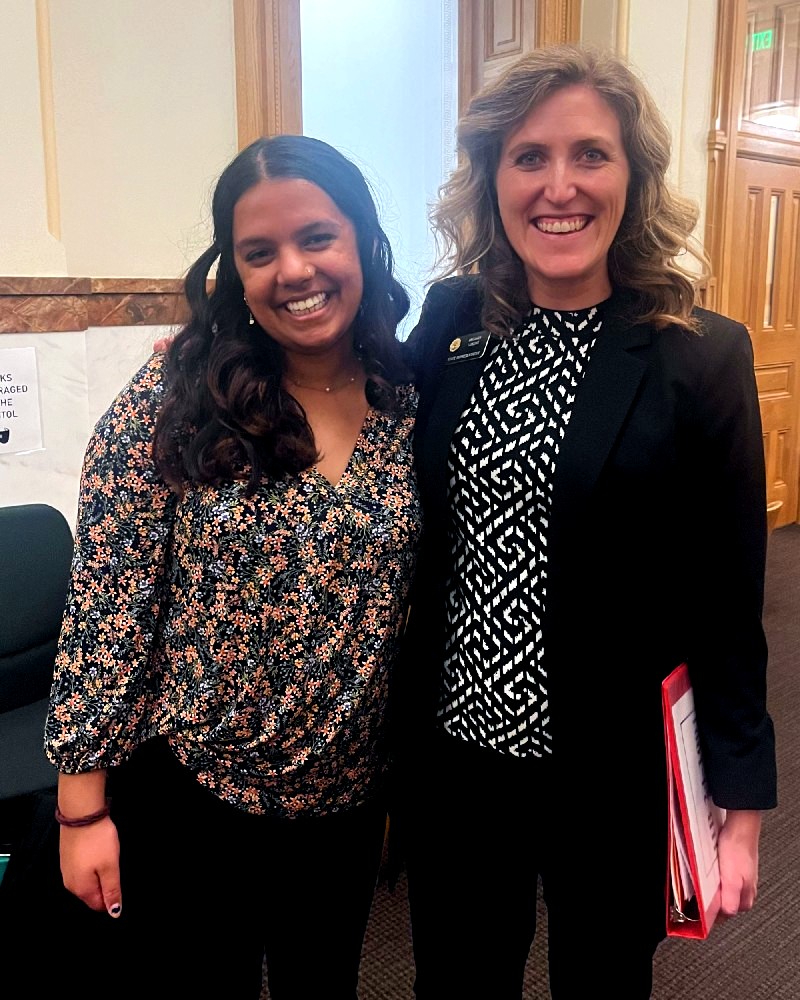


Making the most of intersecting sciences
Photos by Kathy F. Atkinson and courtesy of Nivedita Prabhu June 10, 2025
Student combines biochemistry and political science majors to make an impact
When University of Delaware junior Nivedita Prabhu stood up to ask former New Jersey governor Chris Christie a question about political corruption at the 2024 James R. Soles lecture last fall, she was introduced as a political science and biochemistry double major.
“I was going to go for the double degree in biochemistry too,” joked the UD alumnus who majored in political science. “Instead, I went for a minor in history.”
For Prabhu, an honors student, the combination of laboratory science and social science is the perfect way to achieve her goal of a career in public health. The blend gives her a deeper understanding of the biochemical systems of the human body and the social dynamics of policy and governance. It’s also timely, given the high demand for interdisciplinary approaches to complex health challenges.
“Public health is all about understanding how science intersects with society,” she said. “As I’ve learned more about the world of policy, I’ve realized how important it is to have people who understand both science and governance, to bridge the gap between the two. If I study both, I can work in this field that connects both.”
From Colorado to Delaware
The Boulder, Colorado, native first heard about UD from one of her high school teachers, alumnus Jacob Lehr who graduated in 2006. She was involved with speech and debate teams, which sparked her interest in political science. At the same time she was fascinated with medicine and science. When looking at colleges, she wanted a place where she could continue exploring her passions.
An invitation from the Honors College to be interviewed for a Distinguished Scholars award prompted a visit to Newark, where Prabhu said she fell in love with UD.
“It was pretty much everything I wanted,” she said. “I really liked the honors experience, and I liked that it’s such a big school, but it felt small and welcoming at the same time.”
Scheduling classes can be a challenge, as the prerequisites for some of the biochemistry courses mean those classes must be taken in a certain order. Her political science courses are more flexible, allowing her to add them as her schedule allows. Prabhu’s faculty advisers have guided her along the way, and she is on track to graduate in May 2026, four years after arriving in Newark.
“What drew me in was the collaborative environment here,” Prabhu said. “I’ve never felt like I had to compete with anyone to get ahead, and that has really made all the difference in my college experience.”
Hands-on learning
Prabhu has also taken advantage of opportunities both on and off campus to deepen her knowledge in both disciplines. She began working as a research assistant in the lab of chemistry professor John Koh second semester sophomore year as part of the department’s honors organic chemistry lab program, in which top students are invited to work with a faculty member in place of taking the traditional lab class.

Koh’s lab researches the use of chemically modified lysine analogs that could be used to direct the immune system to generate antibodies useful for medical diagnostics or immunotherapies. The experience has unlocked a new level of learning for her, and has given her the topic for her senior honors thesis.
“By actually setting up reactions, taking TLCs (thin-layer chromatography), and using different instruments, I’ve started to understand the scientific process in a more abstract way than I could from reading textbooks,” Prabhu said. “It’s not just about knowing what the reaction is supposed to look like on paper, but about learning to troubleshoot and think critically when things don’t go according to plan.”
Koh has had biochemistry and political science double majors working in his lab before, but said the blend is unusual. He said the field of science is becoming increasingly more collaborative and that future leaders must be able to communicate complex ideas effectively to policymakers and the public. He pointed to the National Institute for Innovation in Manufacturing Biopharmaceuticals (NIIMBL), headquartered in the Ammon Pinnuzoto Biopharmaceutical Building on UD’s STAR campus, as an example of a successful public-private partnership.
“Science needs people who have the organizational understanding of what we are doing, but can make the message of what we’re doing and the importance of it, clear to others,” Koh said.
While Prabhu’s work in science happens primarily in Koh’s lab on UD’s STAR campus, the Rocky Mountains provide the backdrop for her work in politics and policy.

Last summer she worked on Colorado state Rep. Meghan Lukens’ successful re-election campaign, writing to local organizations asking if they would endorse Lukens, who is now chair of the state’s Education committee. She also got to sit in on committee meetings at the State House in Denver.
During this year’s Winter Session Prabhu worked with Lukens on a policy enabling school districts to set their own regulations for student cell phone usage in the classroom.
“Winter session really made that possible because the legislative session goes from January to May, so if you don't go to school in Colorado, it's really hard to intern,” she said. “Having that month off in January was awesome. I could watch the meetings and see what's going on. It was the coolest thing.”
Bright future
After graduation, Prabhu plans to attend medical school and then get a graduate degree before launching her career.
“The real challenge in public health is understanding how scientific advancements and social policies interact,” Prabhu said. “With my education in both fields, I hope to be part of the solution in tackling global health issues through policy and advocacy.”
Contact Us
Have a UDaily story idea?
Contact us at ocm@udel.edu
Members of the press
Contact us at mediarelations@udel.edu or visit the Media Relations website

